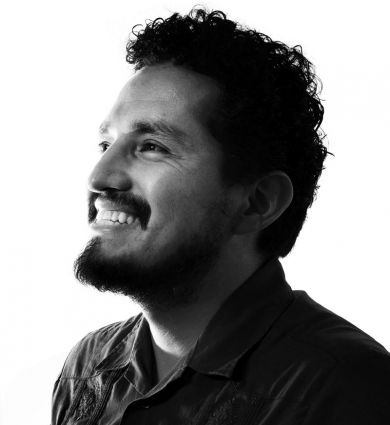

José González
The change in the future begins with us."
José González (MS '09), award-winning outdoor educator, founder and director emeritus of Latino Outdoors, returned to SEAS in January as the Martin Luther King, Jr. month speaker, an annual event hosted by the school’s Office of Diversity, Equity, and Inclusion.
González is currently a partner at The Avarna Group, a consulting group that offers workshops, presentations, strategies, and assessments for businesses striving to integrate social and environmental justice awareness, policies, and culture within the workplace.
Watch González’ MLK lecture, Wayfinding Cultural Connections: From Diversity, Equity, and Inclusion to Decolonizing.
During his time at the Dana Building, González discussed his work with SEAS student and radio host Prachiti Dhamankar (MS ’21). The interview was produced for the SEAS-based and environmentally themed college talk-radio show, “It’s Hot in Here.”
Listen to the full podcast on the It’s Hot in Here website to hear González’ thoughts and insights on underrepresentation in the outdoors, the Green 2.0 report, art, community, and identity.
Earlier that cold morning, González laced up his running shoes at 7:30 am to join SEAS Communications team member and marathon runner Madeline Van Remmen for a fast-paced “Talk on the Trail” through Ann Arbor’s Nichols Arboretum.
Still not out of breath, González shared his perspective on how his SEAS education influenced his career; offered some advice to current students; and spoke about the challenge of “getting in our own way” as we strive to create a more just, and sustainable future.
SEAS: Were there skills that you developed at SEAS that have proven especially useful in your career?
JG: There are many, but some that definitely have stood out have spanned my understanding of policy work—how to communicate to policymakers, and how to communicate policy to the community. Related to that are collaborative decision-making processes and the importance of those.
Secondly, one of the core values of this school is the interdisciplinary nature of the curriculum—which helped me to see that environmental conservation work isn't just about the natural sciences. It isn't just about the ecology. It's fundamental to understand what we're conserving, and why we're conserving it, and that the whole of the biosphere is important for us.
I also learned that there isn't just one path. This isn't like a pipeline approach. It’s a multifaceted process that requires engagement across a wide spectrum of communities. The goal is to have one common direction, sure, but that is going to include a lot of fluidity and also, a few detours. So, what’s needed is more like a watershed approach that requires many different sources. Embracing that idea of expansion is one of the skills that I took away from SEAS.
SEAS: What advice do you have for our current SEAS students who want to make a real impact in their future careers?
JG: Be comfortable with not knowing what's going to happen. If you want to have impact in this this work, in the future, know that you don't need to be in certain types of spaces or roles to have an impact and make change that's profound. You don't have to be the head of a federal agency to have meaningful impact. That can come from the engagement that you have in community, because the world that you can be changing might be the perspective of someone else that they themselves can ripple out.
So, being okay with ‘not knowing’ is important, but that doesn’t mean that you should be careless, or neglect what can happen. It's knowing that what you do, the infrastructure of who you are, of your profession, is set up so that the effects, the outcomes, and the consequences of your actions are lined up to be intentional—and that the ripples of who you are actually make a positive impact in the world.
SEAS: As we work towards a more sustainable world, what do you see as the greatest challenge, and what are you most encouraged by?
JG: I am both encouraged and challenged, I think, by the same idea: We are humans. So, I'm encouraged by the fact that it's doable. It's possible. We can support each other, and we can envision a healthy, vibrant, ecologically sustainable, just future. I believe in that. I see it.
But conversely, we, as humans can also be the main obstacles, and the challenge is that we get in our own way. I don't mean just as individuals, but as a society, and in these agreements that we have; for example, in the design of cities. They didn't just pop out of the ground. Those were all conscious decisions that we made. And once that's set up, it may seem like a lot of work to do it differently or undo it. But we still have that ability. We're not restricted in that choice. It does require, though, doing so much work that requires relationship-building, patience, and dealing with the frustration that comes from knowing that the change isn't as quick as we would like it to be—and we must be willing to deal with the cost and consequences.
But, as we often say, it's not that the earth needs us, it's that we need the earth. The change in the future begins with us.
ABOUT LATINO OUTDOORS:
González founded Latino Outdoors in 2013 to address the lack of Latinx representation in the outdoor, conservation, and environmental education fields. Now, Latino Outdoors is a Latinx-led community and organization (in that order) that is focused on building family and celebrating culture and heritage in the outdoors. Latino Outdoors has grown to operate around the country and is open to all people who wish to celebrate diversity and inclusivity.

